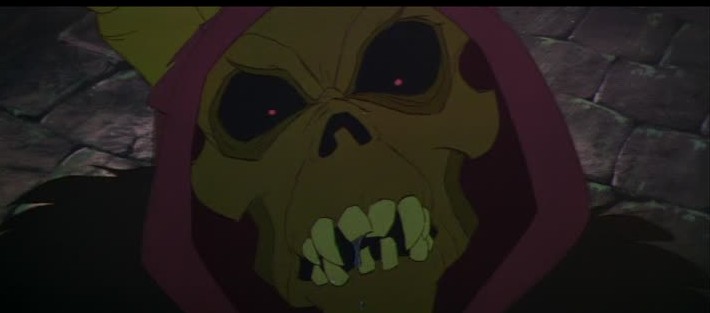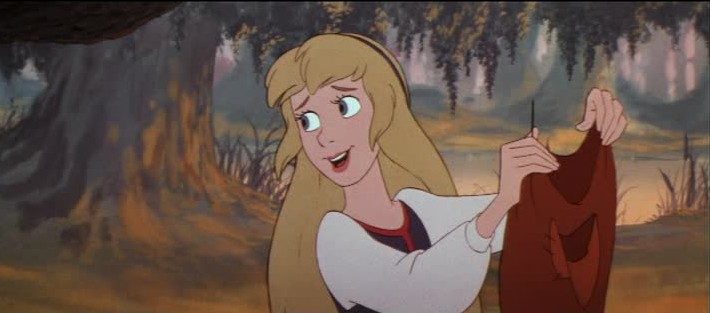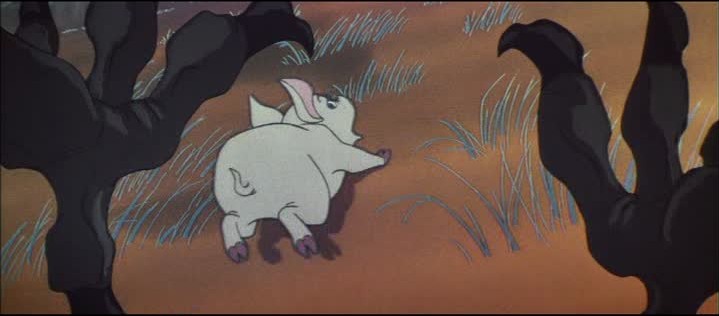What went wrong with Disney's "Black Cauldron"?
 Smalerie has been reading the Chronicles of Prydain. The Red Menace picked Princess Eilonwy as our first kickass fictional lady. My path was clear: it was time to write about The Black Cauldron.
Smalerie has been reading the Chronicles of Prydain. The Red Menace picked Princess Eilonwy as our first kickass fictional lady. My path was clear: it was time to write about The Black Cauldron.
The movie is well known as the black sheep of Disney films, a financial failure that Disney all but disowned. Though the film has its supporters, many animation fans regard it as a low point for Disney. But does the film really deserve all of the hate it gets? How did an animated film the studio once touted as the next Snow White become something that Disney wanted so desperately to forget?
The Black Cauldron wasn't just a flop; it was a big flop. The movie was the most expensive animated film ever made at the time. The final cost was at least $25 million, with some reports placing it closer to $40 million. It was a huge investment of time and money for the Disney animation studio, which hoped the resulting film would be a classic for a new era. Instead, the movie opened to mixed reviews and largely uninterested audiences. Box Office Mojo places the film's total gross below the rerelease of Disney's own 101 Dalmatians that same year and - to Disney's great embarrassment - The Care Bears Movie, which slightly outperformed Disney's new feature and cost far less to make.
Additionally, The Black Cauldron had the misfortune of coming out right after a major shakeup in the Disney company. Ron Miller, Walt Disney's son-in-law, was removed as president of the Disney studio and replaced by new CEO Michael Eisner and chairman Jeffrey Katzenberg. Miller had been a longtime advocate of making an animated film based on Lloyd Alexander's fantasy novels. Eisner and Katzanberg were far less enthusiastic about the costly, long in production film. In fact, after viewing an all but finished cut of the movie, Katzenberg demanded as much as twelve minutes of cuts mere months before the film's scheduled release date, cuts that made the film's already troubled narrative even more disjointed. After the film flopped, the new regime at Disney was probably happy to sweep the production under the rug and write it off as a failure of their predecessors.

Still, the film's financial woes alone don't explain Disney's longtime animosity towards The Black Cauldron. Other Disney films that were box office duds in their initial runs went on to become beloved classics and pay for themselves many times over through theatrical rereleases. The Black Cauldron had the additional problem of being very tough to market to typical Disney audiences. The movie features a skull headed villain with horns and blazing red eyes, a plot centered on creating an army of undead warriors, a not insignificant amount of blood, and a prologue that describes how the cauldron was created when an evil man was thrown alive into molten metal. Scenes of a man being dissolved by mist and the skeletal Cauldron Born killing a man were among those cut from the film. For all its magical elements, the movie just wasn't a good fit for a studio known for children's entertainment.
Now I'm not criticizing Disney for trying to appeal to an older audience. Animation can tell stories for adults, children, families, and anyone else you can think of. But rather than simply trying to broaden its appeal, Disney was actively alienating its core audience of families with young children while hoping to lure in a teenaged audience that never materialized. It's possible that Disney just couldn't shake the image of cutesy films for tiny tots. But having watched the movie again, I think older viewers had additional reasons to stay away.
By the time The Black Cauldron was released, the Chronicles of Prydain were around twenty years old and had won numerous children's literature awards. The books obviously had fans who would have been excited to see the world of Prydain on the big screen. Unfortunately, there's very little in the movie for those fans to enjoy. Author Lloyd Alexander himself admitted that - although he enjoyed the movie - it had almost nothing to do with his books. The issues go far beyond rabid fans complaining about minor omissions or changes. So much of the original story has been so drastically altered that the books' relation to the film is more "loosely inspired by" than "based on." Characters are completely misrepresented, cut outright, or given so little to do that their presence in the film hardly makes sense. Swapping Princess Eilonwy's red-gold hair for gold-gold hair is one of those inexplicable changes in the translation from book to film that seems to serve no purpose beyond annoying fans of the books, such as the Red Menace.

An inaccurate adaptation of a great series of books can still be a good movie on its own merits, but this is where The Black Cauldron really falls flat. The story simultaneously meanders around spending too much time on scenes of little importance to the plot and crams in so many characters and ideas that there is no time to fully explore any of them. Taran does have something of a character arc, starting off as a young boy itching for battle and adventure and learning some of the consequences and challenges that go with the life of a hero over the course of the movie. But the resolution of the story becomes less about Taran's newfound wisdom and more - like much of the movie - about Gurgi. Fflewddur Fflam, the bard with a penchant for exaggeration whose harp breaks a string whenever he bends the truth, seems tailor made for animation. Yet the film gives him almost nothing to do and reduces his harp to a gimmick without payoff. The cantankerous fairy Doli - a dwarf in the original books - and the rest of the Fair Folk serve no purpose in the movie, even taking into consideration that their main scene was once much longer. Despite his frightening appearance, the Horned King does little beyond talking about his evil plans and strangling Creeper, his Disney created lackey. Poor Eilonwy fares the worst of all, becoming exactly what she isn't in the books: a generic princess who is primarily a love interest for the hero.
It's not just the characters who are underdeveloped; it's the whole world of Prydain. The movie gives lip service to the idea of a war, but never explains who is fighting or why. The kingdom barely seems inhabited beyond a handful of main characters, so when the Horned King's plans put all of Prydain in jeopardy, it's hard to feel like the stakes are high.

The Black Cauldron does have its good points, mostly on the technical side. There are some great shots of one of dragon-like gwythaints chasing Taran's pig Hen Wen where the camera zooms along alternately tracking the movements of the airborne predators or the frightened pig. The film features some very early use of computer animation on the titular cauldron and the conveniently located boat that Taran and friends use to escape the Horned King's crumbling castle. There were once plans to have a three dimensional hologram of one of the Cauldron-born menace the audience, but the idea was nixed due to the high cost of fitting theaters with cameras capable of projecting the effect. A whole host of artists who would go on to become top Disney animators or luminaries outside of the studio - Andreas Deja, Mark Henn, Glen Keane, and even Tim Burton have their names in the credits and the film does occasionally show hints of the greatness yet to come from these artists.
In the end, The Black Cauldron disappoints on nearly every level. It is not an authentic retelling of the beloved novels it is based on, yet it seems determined to include characters who no longer serve the story simply because they were in the book. It's too strange and dark to sit comfortably on the shelf beside its fellow Disney films, but still too much a Disney film to be embraced by the teenaged audience it hoped to win over. It is neither smart enough to wrap up its own story in a satisfying way nor fairy tale simple enough that magic is explanation enough for the film's conclusion. What's truly heartbreaking is that The Black Cauldron is still the only film adaptation of the Chronicles of Prydain. I don't doubt that there's a great movie to be made from the books. Sadly, Disney's film is not it.
